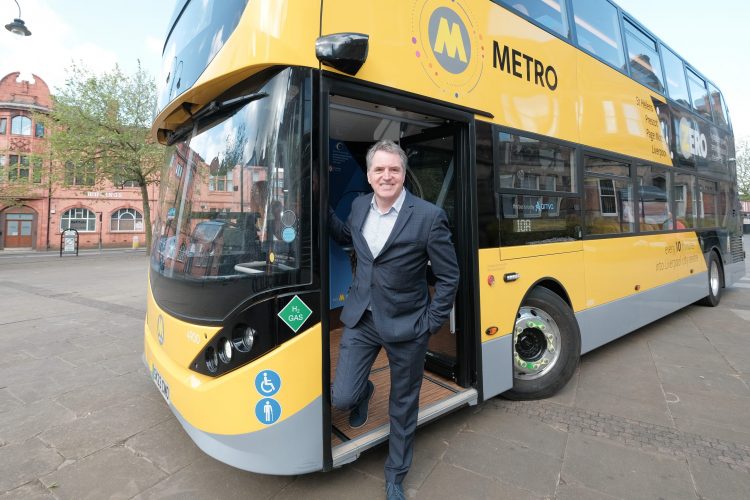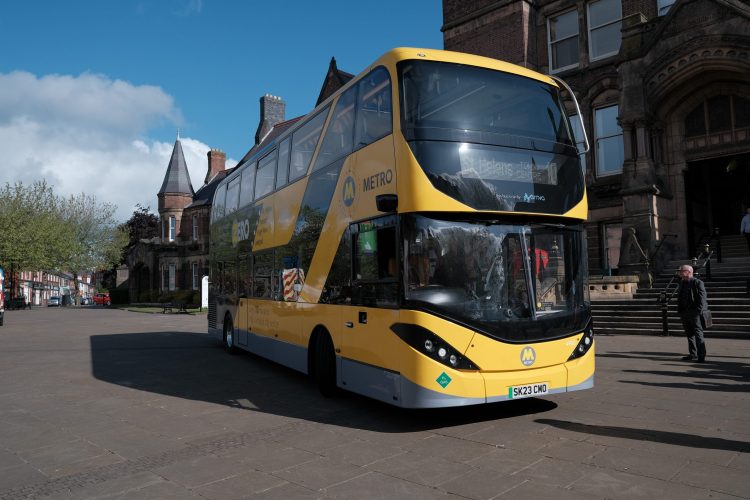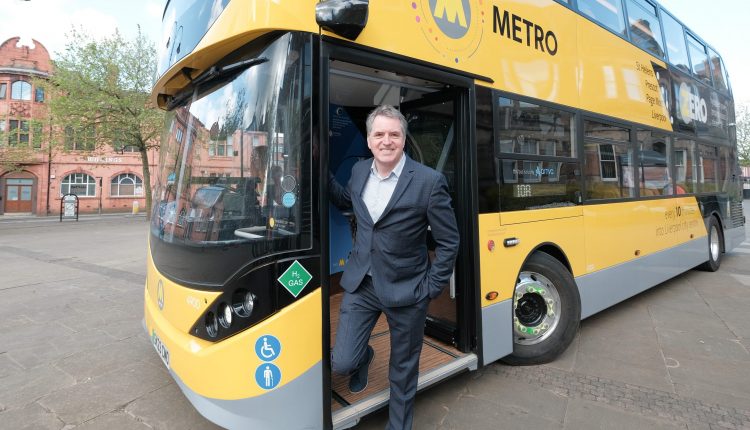Liverpool city region’s new £12.5m hydrogen bus fleet is in service for the first time this week – but the hydrogen powering them will be produced using fossil fuels. Tony McDonough reports

A new fleet of hydrogen buses has started carrying passengers in Liverpool city region heralding a new era of emissions-free public transport in Merseyside
Following weeks of driver training, the 20-strong fleet, bought by the Liverpool City Region Combined Authority for £12.5m, will be operated by Arriva and Stagecoach on the 10A route between St Helens and Liverpool city centre.
Rather than using traditional diesel fuel, the buses will instead be filled up with hydrogen at a depot in St Helens. The vehicles, built by Alexander Dennis, emit only water vapour so that is a major plus in terms of pollution.
However, the buses cannot yet be described as net zero because the hydrogen that is fuelling them is being produced by burning natural gas. The resultant emissions will contribute towards climate change.
The Combined Authority has told LBN it is committed to eventually powering the business using “100% sustainable hydrogen”. This illustrates the huge technical challenge in transitioning to net zero carbon.
Hydrogen is the most abundant element in the universe but it rarely exists in nature on its own. To be captured and used it has to be isolated from water or gas using energy intensive processes.
According to the International Energy Agency, 96% of hydrogen produced across the world each year is made using fossil fuels, including coal, oil and natural gas. This contributes significantly to climate change.
In the UK the Government is pinning part of its net zero hopes on something called blue hydrogen. This is hydrogen produced by burning natural gas. However, the carbon emissions are captured and stored instead of being released into the atmosphere.
In the North West the multi-billion pound HyNet project aims to be producing blue hydrogen at the Stanlow oil refinery close to the River Mersey by 2026. It will capture and store the emissions in depleted gas caverns under Liverpool Bay.
Carbon capture and storage (CCCS) is a controversial method disliked by a number of energy experts. They point out that it has not yet been successfully achieved yet at scale anywhere in the world and is just a way of extending the use of fossil fuels.
A cleaner way to produce hydrogen is so-called green hydrogen. This method sees water put through a device called an electrolyser which then separates out the hydrogen molecules. It is powered by renewable energy such as wind or solar.
However, the UK does not yet have anywhere near enough renewables capacity to produce hydrogen in this way at scale. The UK Government insists blue hydrogen is the medium-term bridge to green.
In a stayed to LBN, the Combined Authority said: “The hydrogen currently fuelling these new buses has been created from natural gas – with the ultimate, long-term goal for the city region being to transition to 100% renewable energy.
“Operator Arriva and a major hydrogen fuel supplier are in advanced talks to deliver on that ambition.
“Mayor Rotheram and the Combined Authority have repeatedly outlined their vision to stake the city region’s claim as Britain’s renewable energy coast and remain fully committed to working with partners to achieve a long-term pathway to 100% sustainable hydrogen fuel supply.”

The buses will operate on so-called “green routes”. These will be implemented through a combination of priority lanes, traffic signal upgrades, remodelled junctions and upgraded, accessible passenger facilities.
On board passengers will see increased wheelchair and pram capacity. There will also be wireless and USB phone charging, internet access and reading lights above the seats.
READ MORE: Metro Mayor launches city region bus consultation
READ MORE: What will be the legacy of ‘best ever’ Eurovision?
Metro Mayor Steve Rotheram said: ““Today marks a monumental moment in our region’s history as our new publicly owned hydrogen buses enter service for the first time.
“This new fleet is the gold standard of public transport that our residents deserve – and signifies another huge step forward in our journey to revolutionise our region’s bus network.
“The only emission they produce is clean water vapour, which will be massive in helping our region to hit its target to be net zero by 2040 – at least a decade before national government.”

